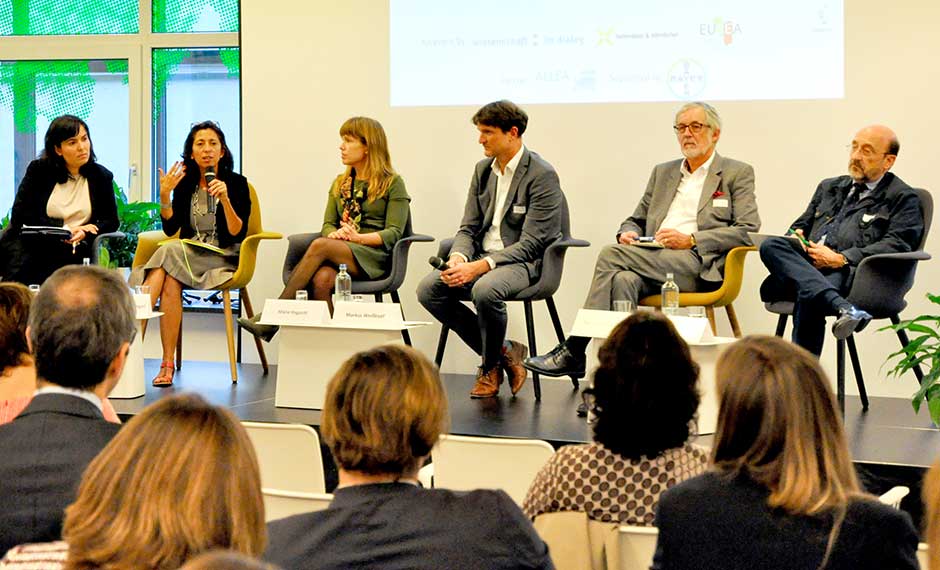Science is everywhere around us and therefore must be publicly discussed. This was the context for two events on collaboration and future strategies in science communication in Brussels on 17 October, organised by Wissenschaft im Dialog, the European Science Engagement Association, ALLEA – ALL European Academies and VA (Public & Science), supported by Bayer.

Social developments triggered by digitalisation, big data, artificial intelligence, curing diseases by modifying the genome of organisms and developing high-tech solutions to slow down climate change – these are just a few topics of enormous societal and political relevance with a direct connection to science and research. In our complex and constantly changing world science is everywhere and thus should be publicly debated.
Communication about science-related topics with the public is shaped by various stakeholders and their individual perspectives and concerns: Researchers promoting their projects and findings, institutional science communicators developing science education and engagement projects, science managers securing research funding, journalists reporting research outcomes, NGOs standing up for their values, industry communicating about their products and also politicians using scientific results for policy making – just to name a few. This diversity of stakeholders makes communicating about science complicated, but it gets even more complex when different regional, national and international frameworks as well as various personal or media-mediated contexts are taken into account.
Stakeholder cooperation for science communication
It is therefore natural that citizens might get confused about the information they come across and not know what to believe when confronted with science-related news and arguments – particularly given the amount of information and the limited time to deal with it. At the same time, having your science right and correctly understanding research findings can be of enormous importance, for example when making decisions in your personal life but also on a societal level. And even though different stakeholders in the field of science do not necessarily agree on how science and research can best contribute to the development of our society, they have a common interest in having an open and productive as well as science-driven and knowledge-informed public discourse.
75 representatives from science, industry, media, civil society and politics met on 17 October in Brussels to discuss challenges and opportunities of strategic and interconnected communication about socially relevant research topics in Europe. After an introduction by keynote speaker Professor Pere Puigdomènech (Centre for Research in Agricultural Genomics in Barcelona/ALLEA) about genome editing and its communication, which was chosen as an example topic, the participants exchanged experiences and views regarding formats, processes and structures of science communication in workshops, as well as panel and plenary discussions.
Transparency and communicating uncertainty are key
Many participants argued that stakeholders should generally think less about what they want to disseminate and more about how to listen to the needs and concerns of their target groups. Apart from that, the participants emphasised that being transparent about the possible risks of a technology and open about uncertainty and the often provisional character of scientific findings, are key elements of communicating research with integrity. One proposed way to do so is to differentiate more clearly between new findings and their possible applications.
Keynote speaker Professor George Gaskell (London School of Economics) illustrated this argument by referring to research on public attitudes towards gene technology. Attitudes are not primarily driven by the appreciation of the technology as such, but rather by the different potential uses and applications the technology might have. This was supported by survey results from a current European project, Orion Open Science, which show that people are more positive towards using genome editing in order to develop new medicines than using the same technology to enhance plants.
Different aims of science communication
Knowing how to professionally and engagingly communicate about research with the public is only part of the challenge of modern science communication. Participants also expressed the opinion that there has been too little focus on analysing and differentiating between possible goals and aims of science communication. Only by thinking in advance about the intended impacts of science communication – ranging from information, to education and knowledge transfer, public dialogue, stakeholder engagement or intended behavioural changes – can the communication become more strategic.
Too often random activities, hidden agendas or in the worst case unintended side effects, get in the way of effectively and strategically communicating about science and research. This was also one of the main points discussed in an evening panel for which the results from the preceding workshops provided the basis. Jim Dratwa (European Commission, Head of the European Group on Ethics in Science and New Technologies Office), Tiemo Wölken (Member of the European Parliament), Professor Gloria Origgi (CNRS Paris/ALLEA) and Christophe Kampa (Bayer Digital & Innovation Communication) had an intense discussion with the participants on the topic of communicating science in a complex world from their individual positions.
Even though the panel discussion illustrated that various stakeholders often have different perspectives on a specific research topic, and different aims when communicating about it, it also showed that they share an interest in an open and forward-looking public dialogue. This could lay the foundation of future coordination and collaboration within European science communication, in which different stakeholders communicate about research from their individual points of view but jointly stand up for the value of science in our society. We, the organisers and participants of the event, agreed to strive towards this common goal and put it into practice in the future.
Ricarda Ziegler, Strategy Officer Wissenschaft im Dialog
Cissi Askwall, Secretary General Vetenskap & Allmänhet
Daphne van Doorn, Policy Advisor Bayer AG
Read also an event report on the two events by ALLEA
Update 2019-04-23: For further insight in this issue, please read this article about the main discussions and results that came up during the two stakeholder workshops in late 2018. Written by Michael Wingens, Ricarda Ziegler, Markus Weißkopf.
